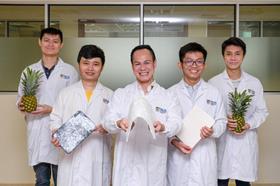
Researchers from the National University of Singapore (NUS) have used pineapple leaf fibres to make biodegradable aerogels that can increase the shelf life of fruits and vegetables.
The aim of the NUS mechanical engineering team was to find a sustainable use food waste and it has been able to develop an ultra-light aerogel that when coated with specific chemicals, can absorb ethylene gas.
Duong Hai-Minh, leader of the research team, said it had the potential to help farmers make the most out of their pineapples.
“These eco-aerogels made from pineapple leaf fibres are very versatile, they are effective as oil absorbents and for heat and sound insulation, we have also demonstrated their potential applications in food preservation and wastewater treatment,'explained Hai-Minh.
'This is a big step towards sustainable agriculture and waste management and provides an additional source of income for farmers.”
Nhan Phan-Thien, a senior member of the research team, said to perform the function of food preservation, the eco-aerogels are modified with activated carbon powder giving them the ability to delay ripening for up to two weeks.
“Vast quantities of fresh agricultural produce are discarded due to inadequate post-harvest storage and processing facilities, as well as inefficient or disrupted transportation systems. Therefore, cutting down spoilage can go a long way in reducing waste,” Phan-Thien said.
“In our lab experiments, eco-aerogels modified with activated carbon can delay the rotting process by at least 14 days. The modified eco-aerogel can absorb six times more ethylene than commercial potassium permanganate ethylene absorbents. This is also a safer method compared to the conventional use of strong oxidising agents, and more efficient than non-toxic chemical sprays, for food preservation.”
The team has filed a patent for the production of the eco-aerogels and has plans to work with an industry partner to scale up and commercialise this technology.



